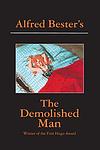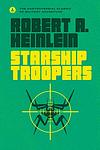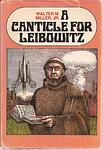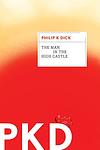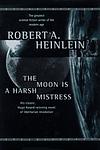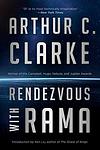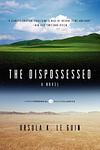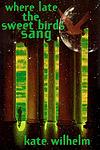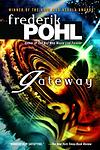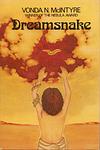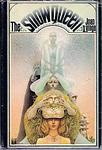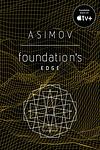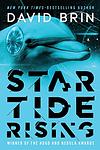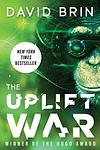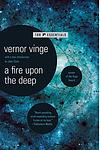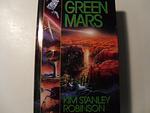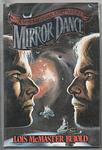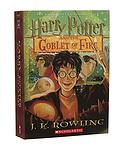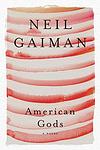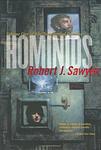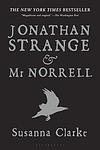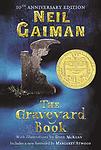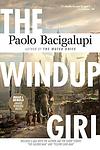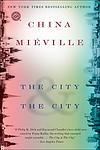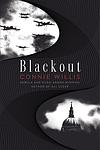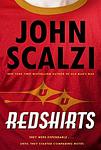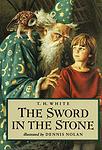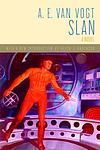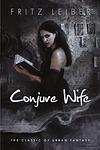Hugo Award for Best Novel
This is one of the 284 lists we use to generate our main The Greatest Books list.
-
The Demolished Man by Alfred Bester
In a future society where telepaths, known as Espers, are integrated into all levels of society, a powerful businessman plots the perfect murder, believing he can outwit the telepathic police. His cat-and-mouse game with a determined Esper detective unfolds in a world where mental privacy is nearly extinct, and the concept of crime has taken on new meaning. The businessman's struggle against the pervasive telepathic surveillance and his own conscience leads to a suspenseful and philosophical exploration of free will, guilt, and the possibility of redemption.
-
They'd Rather Be Right by Mark Clifton
The book explores the consequences of creating a supercomputer with the ability to enhance human intelligence and extend life indefinitely. The machine, known as Bossy, becomes the center of controversy and fear, as it requires individuals to completely surrender their prejudices and preconceived notions to benefit from its gifts. The story delves into themes of human resistance to change, the struggle between individuality and the greater good, and the societal upheaval that ensues when a technology offers the potential for a utopian existence, but at the cost of deeply ingrained human traits and beliefs.
-
Double Star by Robert A. Heinlein
In this science fiction novel, a down-on-his-luck actor is unexpectedly recruited to impersonate a prominent politician who has been kidnapped by political opponents. As he becomes more deeply involved in his role, he finds himself drawn into the world of interplanetary politics and must navigate the complexities of diplomacy among various human and alien factions. The actor's performance becomes so convincing that he begins to merge with his character, leading to a crisis of identity and a deep commitment to the politician's cause. The story explores themes of identity, responsibility, and the nature of political power.
-
The Big Time by Fritz Leiber
"The Big Time" is a science fiction novel that delves into the concept of a temporal war, where two factions, the Spiders and the Snakes, battle across history to shape the future to their design. The story unfolds in a rest-and-recreation station outside of normal time and space, known as The Place, where soldiers from different eras are recruited to fight in this endless conflict. The narrative is driven by the personal experiences and interactions of these soldiers, particularly focusing on the perspective of Greta, an entertainer at The Place, as they grapple with the implications of their existence outside of time and the moral complexities of their roles in the war. The novel explores themes of identity, causality, and the nature of conflict, all within the confines of a tightly controlled setting that challenges the very notion of reality.
-
A Case of Conscience by James Blish
In this science fiction novel, a Jesuit priest and biologist, part of a four-man scientific commission, grapples with a moral dilemma after studying the inhabitants of the planet Lithia. The Lithians are an advanced, peaceful reptilian species living in an apparent utopia without any concept of religion or God. The priest's crisis deepens as he questions whether the Lithians' society is inherently evil, a creation of Satan designed to challenge faith, or if it can coexist with human and Christian values. His quandary is compounded when he is given a Lithian egg to take back to Earth, which hatches into a creature that could influence the future of humanity and challenge the very foundations of his beliefs.
-
Starship Troopers by Robert A. Heinlein
The book is a military science fiction novel set in the future, where humanity is engaged in an interstellar war against an alien species known as the Arachnids or "Bugs." It follows the story of Juan "Johnny" Rico, a young infantryman in the Mobile Infantry, a futuristic military unit equipped with powered armor suits. The narrative delves into Rico's experiences and growth from a naïve recruit to a seasoned officer, exploring themes of citizenship, duty, and the moral complexities of war. Through Rico's eyes, the novel examines the structure of a militaristic society where full citizenship and the right to vote are earned through military service, presenting a society that values sacrifice and responsibility in a perpetual struggle for survival against a hostile universe.
-
A Canticle for Leibowitz by Walter M. Miller
"A Canticle for Leibowitz" is a post-apocalyptic science fiction novel that explores the cyclical nature of history through the lens of a Catholic monastery in the American Southwest. After a devastating nuclear war, the monks of the Albertian Order of Leibowitz work to preserve the remnants of mankind's scientific knowledge until the world is again ready for it. Over the course of centuries, civilization rises and falls, wars are fought, and scientific advancements are rediscovered and then lost again. The novel is a poignant commentary on the potential for humanity to repeat its mistakes.
-
Stranger in a Strange Land by Robert A. Heinlein
The novel follows the life of Valentine Michael Smith, a human who was raised on Mars and returns to Earth in early adulthood. Smith struggles to understand human culture, norms, and conventions, while also possessing extraordinary psychic abilities. As he navigates Earth society, he begins to question many of its institutions and values, ultimately creating his own religion to pass on the wisdom he gained on Mars. The book explores themes of freedom, self-reliance, and the nature of humanity, and is considered a classic of science fiction literature.
-
The Man in the High Castle by Philip K. Dick
Set in an alternate history where the Axis powers won World War II, this novel explores life in a world where the United States is divided into three parts: the Pacific States of America, controlled by Japan; the Rocky Mountain States, a neutral buffer zone; and the United States of America, controlled by Nazi Germany. The story follows several characters, including a jewelry designer, a trade minister, and a German secret agent, as they navigate this dystopian reality. The narrative is further complicated by the existence of a banned novel that depicts an alternate reality where the Allies won the war, causing characters to question their understanding of reality.
-
Here Gather the Stars by Clifford D. Simak
In "Here Gather the Stars," a science fiction novel, the protagonist is a space-faring trader who comes across an ancient, abandoned alien library that holds the knowledge of countless civilizations. As he delves into the library's secrets, he discovers that it offers not only advanced technology but also profound philosophical insights. The novel explores themes of isolation, the importance of knowledge, and humanity's place in the cosmos, as the protagonist grapples with the implications of this newfound wisdom and the moral dilemmas it presents, ultimately questioning what it means to be human in an infinite universe.
-
The Wanderer by Fritz Leiber
"The Wanderer" is a science fiction novel that explores the chaos and wonder that ensues when a mysterious, planet-sized object appears in Earth's orbit, causing widespread destruction through tidal effects and societal upheaval. As the celestial visitor, dubbed "The Wanderer," reveals its patchwork surface of alien landscapes, a diverse cast of characters from across the globe—including a poet, a scientist, and a pair of lovers—must confront their existential crises and navigate the new reality. Their interconnected stories delve into themes of curiosity, resilience, and the human spirit's response to the unknown, all while humanity grapples with the potential end of the world and the possibility of extraterrestrial contact.
-
Dune by Frank Herbert
Set in a distant future, the novel follows Paul Atreides, whose family assumes control of the desert planet Arrakis. As the only producer of a highly valuable resource, jurisdiction over Arrakis is contested among competing noble families. After Paul and his family are betrayed, the story explores themes of politics, religion, and man’s relationship to nature, as Paul leads a rebellion to restore his family's reign.
-
...And Call Me Conrad by Roger Zelazny
The novel follows the story of a man who, after Earth has been devastated by a nuclear war, possesses the ability to alter reality and travel through time. He embarks on a quest for vengeance against the alien race that he blames for the Earth's destruction. Along the way, he grapples with his own identity and purpose, as well as the complexities of power, morality, and human nature. His journey is marked by encounters with historical figures, mythological elements, and the challenge of reconciling his desire for revenge with the need for a new beginning for humanity.
-
The Moon is a Harsh Mistress by Robert A. Heinlein
In the late 21st century, the moon has become a penal colony where the inhabitants, known as "Loonies", live under harsh conditions and are exploited by the Earth's government. A supercomputer named Mike, a one-armed computer technician named Mannie, and a revolutionary named Wyoming Knott lead an uprising against the Earth's oppressive rule. With Mike's intelligence, Mannie's technical skills, and Wyoming's charisma, they successfully instigate a rebellion, navigating political intrigue, military strategy, and complex human relationships along the way.
-
Lord of Light by Roger Zelazny
The book is a science fiction and fantasy blend that tells the story of a far-future world where the original human colonists have developed technology that allows them to take on the aspects of Hindu gods, effectively granting them immortality and immense power. The story's protagonist, who aligns himself with the figure of the Buddha, seeks to undermine this new pantheon's despotic rule and bring enlightenment and freedom to the mortal populace. He navigates a complex landscape of politics, religion, and rebellion, using both cunning and philosophical insight to challenge the status quo and offer a different path for humanity's evolution.
-
Stand on Zanzibar by John Brunner
The novel is a dystopian vision of the year 2010, where the world grapples with overpopulation, ecological disasters, and widespread social unrest. It follows a multitude of characters, including a high-level executive and a data analyst, as they navigate a society dominated by multinational corporations and a supercomputer that predicts social trends. The narrative is fragmented, employing a unique style that interweaves different types of texts to reflect the chaotic and information-saturated world it depicts. Themes of eugenics, media saturation, and corporate power are explored in a world that is at once technologically advanced and socially fragmented.
-
The Left Hand Of Darkness by Ursula K. Le Guin
The novel is a groundbreaking work of science fiction that explores themes of gender, politics, and identity. Set on a planet called Gethen, where the inhabitants are ambisexual, shifting between male and female, the story follows an envoy from Earth who struggles to understand this alien society. As he navigates the complex political landscape of Gethen, he must also grapple with his own preconceptions about gender and sexuality. The book is a profound exploration of difference, otherness, and what it means to be human.
-
Ringworld by Larry Niven
In this science fiction novel, a motley crew of explorers, including a 200-year-old human, a young woman with lucky genes, a cat-like alien, and a two-headed alien guide, embark on a journey to investigate an artificial ring orbiting a star. This colossal structure, known as the Ringworld, has the surface area of millions of Earths and harbors many mysteries. As the team explores the vast, enigmatic world, they encounter a variety of advanced technologies and alien species, while also grappling with the physics and dangers of the ring's environment. Their mission becomes a struggle for survival and a quest to uncover the origins and purpose of the Ringworld.
-
To Your Scattered Bodies Go by Philip José Farmer
In this science fiction novel, every human who has ever lived is resurrected along the banks of an enigmatic river on an unknown planet. The protagonist, a 19th-century explorer, awakens in this afterlife and quickly discovers that he is not alone. Surrounded by historical figures and ordinary people from all eras and cultures, he must navigate a new existence where basic needs are met but the greater mysteries of this world—such as who is responsible for the resurrection and the purpose of this second life—remain unsolved. As he forms alliances and seeks answers, he also contends with the darker aspects of human nature that persist in this strange hereafter.
-
The Gods Themselves by Isaac Asimov
In a tale of science fiction that explores the consequences of unchecked technological advancement, the story unfolds across parallel universes, where a seemingly miraculous energy exchange between Earth and a parallel world inhabited by strange, energy-based life forms promises an endless supply of power. However, this gift comes at a potentially catastrophic cost. A physicist discovers that the exchange could lead to the destruction of both universes due to the differing physical laws governing them. The narrative weaves through the perspectives of humans and alien beings as they grapple with the moral and existential implications of their actions, ultimately questioning the very nature of progress and the ethical responsibilities of scientific discovery.
-
Rendezvous with Rama by Arthur C. Clarke
In this science fiction classic, humanity encounters an enigmatic alien starship that enters the solar system. Named after the Hindu god, the cylindrical vessel is initially thought to be an asteroid but is soon revealed to be a spacecraft. A team of astronauts is dispatched to intercept and explore the mysterious object, embarking on a high-stakes mission to unlock its secrets. As they journey through the ship's interior, they discover a world of astonishing complexity, artificial landscapes, and advanced technology, all of which challenge their understanding of life and intelligence in the universe. The explorers must race against time to learn as much as possible before the ship, indifferent to their presence, continues on its voyage through the cosmos.
-
The Dispossessed by Ursula K. Le Guin
The novel is a profound exploration of two vastly different societies on twin planets, Urras and Anarres. The protagonist is a brilliant physicist from Anarres, a planet with an anarchist society, who travels to Urras, a planet with a capitalist and authoritarian regime. The book explores his struggle to reconcile his anarchist beliefs with the stark realities of a different socio-political system. It's a thought-provoking investigation of human nature, power structures, and the idea of utopia.
-
The Forever War by Joe Haldeman
This science fiction novel follows the story of a soldier conscripted to fight in an interstellar war against an alien species known as the Taurans. Due to the time dilation effects of space travel at near-light speeds, the soldier experiences only months of combat, while centuries pass on Earth. Each time he returns from a mission, he finds an unrecognizable society with new technologies and altered social norms. The narrative explores the psychological and emotional impact of war, time displacement, and the soldier's struggle to find a sense of belonging in a constantly changing world. As the conflict drags on through the eons, the soldier begins to question the purpose of the war and the high cost of human life in the face of such temporal vastness.
-
Where Late the Sweet Birds Sang by Kate Wilhelm
In a post-apocalyptic world ravaged by environmental collapse and infertility, a surviving community turns to cloning to preserve humanity. As generations of clones are produced, they form a collective consciousness that values conformity over individuality. The story explores the complex relationship between the last of the original humans and their clone descendants, as well as the clones' struggle to understand the concept of individuality. When a clone with unique artistic abilities is born, it challenges the community's rigid structure and raises profound questions about identity, creativity, and the very essence of human nature.
-
Gateway by Frederik Pohl
In this science fiction novel, an impoverished miner discovers an alien space station filled with starships. The ships are preprogrammed by a long-dead alien race, known as the Heechee, to travel to different parts of the universe. The miner becomes a prospector, risking his life to travel on these ships in hopes of finding valuable alien artifacts. However, the trips are incredibly dangerous, as no one knows where the ships are programmed to go or what they will find there. The story is told in a series of flashbacks, as the miner undergoes psychotherapy sessions to deal with the trauma of his experiences.
-
Dreamsnake by Vonda N. McIntyre
In a post-apocalyptic world where technology has regressed and healing is often done through natural means, a healer embarks on a quest to replace her rare and valuable dreamsnake, a creature used in her healing practices that was tragically killed. Throughout her journey, she encounters various communities and individuals, each with their own customs and challenges, while confronting the prejudices and superstitions surrounding her profession. As she navigates this fragmented society, the healer must overcome personal and external obstacles to find a new dreamsnake and continue her vital work of healing and helping others.
-
The Fountains of Paradise by Arthur C. Clarke
The book envisions a future where a visionary engineer undertakes the monumental task of constructing a space elevator, a tower stretching from the Earth's surface into geostationary orbit. Set on a fictional island closely resembling Sri Lanka, the narrative intertwines the engineer's ambitious project with the island's ancient history and religious traditions. As the protagonist grapples with technical challenges, political hurdles, and personal conflicts, the story explores themes of human ingenuity, the quest for progress, and the delicate balance between preserving the past and embracing the future. The space elevator concept, a staple of speculative fiction, serves as a metaphor for humanity's reach for the stars and the technological leaps necessary to achieve such dreams.
-
The Snow Queen by Joan D. Vinge
In this science fiction retelling of a classic fairy tale, a young woman with telepathic abilities must navigate a complex interstellar society ruled by a powerful and enigmatic figure known as the Snow Queen. The protagonist's journey is one of self-discovery and rebellion as she seeks to rescue her beloved, who has been ensnared by the Snow Queen's influence. Set against a backdrop of political intrigue, ecological concerns, and the cyclical nature of change, the story explores themes of love, identity, and the struggle for freedom within a universe where technology and ancient myth intertwine.
-
Downbelow Station by C. J. Cherryh
Set in the midst of interstellar conflict, the novel unfolds against the backdrop of a space station that serves as a key strategic asset in the war between Earth and its far-flung colonial star systems. As the station, located above the planet Pell, becomes a refuge for people fleeing the war-torn sectors of space, tensions rise among the station's inhabitants, the Earth forces, and the various alien species seeking sanctuary. The station's leaders must navigate a complex web of political intrigue, shifting alliances, and ethical dilemmas to maintain order and ensure the survival of Pell's inhabitants, all while the specter of a larger cosmic battle looms overhead.
-
Foundation's Edge by Isaac Asimov
In this science fiction novel, the protagonist, Golan Trevize, is sent on a quest to discover the origins of the Foundation, a society established to preserve knowledge and culture in the galaxy. Alongside a scholar, Janov Pelorat, and a telepathic woman, Bliss, Trevize's journey leads them beyond the boundaries of the known galaxy to two secretive worlds: Gaia, a planet with a collective consciousness, and Earth, the long-forgotten origin planet of humanity. The novel explores themes of free will versus determinism, the role of individuality within a collective society, and the search for a balanced path to galactic harmony, all while questioning the validity of the Seldon Plan, a predictive model for the future of civilization.
-
Startide Rising by David Brin
In this science fiction novel, a spaceship crewed by a unique ensemble of genetically enhanced dolphins, a few humans, and a chimpanzee, finds itself stranded on a water world after a disastrous first contact with an alien fleet. The crew, aboard their vessel designed for interspecies cooperation, must navigate complex social dynamics and external threats as they repair their ship. Meanwhile, they are caught in the crossfire of a galactic conflict, with various alien races eager to capture the ship's secrets, including the knowledge of a long-lost fleet of starships from a mysterious and powerful race. The crew's survival hinges on their ability to work together and utilize their combined intelligence, while they also grapple with the implications of their evolutionary advancements and the responsibilities that come with them.
-
Neuromancer by William Gibson
In this groundbreaking cyberpunk novel, a washed-up computer hacker is hired by a mysterious employer to pull off the ultimate hack. As he navigates a dystopian future filled with artificial intelligence, corporate espionage, and virtual reality, he must confront his own past and the dark realities of the digital world. The narrative explores themes of technology, identity, and consciousness, pushing the boundaries of science fiction literature.
-
Ender's Game by Orson Scott Card
A young prodigy is enlisted into a military academy in space, where he is trained through complex war games to combat an impending alien invasion. Despite his initial struggles with isolation and manipulation by the academy's leaders, he rises through the ranks due to his strategic genius and leadership skills. The protagonist grapples with the moral implications of war and the cost of his own humanity, as he is groomed to be the Earth's ultimate weapon against the alien threat.
-
Speaker for the Dead by Orson Scott Card
In the sequel to a science fiction classic, humanity faces the complex consequences of its past actions. The protagonist, a once-revered child military genius, now serves as a "Speaker for the Dead," a role dedicated to telling the true stories of the deceased. He travels to a distant world to speak for a deceased researcher and becomes embroiled in the tensions between the human colonists and the planet's enigmatic indigenous species. As he unravels the mysteries surrounding the researcher's death, he confronts his own history and seeks redemption by fostering understanding and empathy between the two intelligent species, hoping to prevent the cycle of violence and misunderstanding that has plagued human history.
-
The Uplift War by David Brin
In a science fiction universe where a galactic civilization is built on the patronage and "uplift" of pre-sentient species into intelligence, a human colony on a distant planet finds itself embroiled in an interstellar war. The planet's inhabitants, including humans, their uplifted chimpanzee allies, and other indigenous species, must navigate the complex politics and military strategies of various alien races. As they struggle to defend their home and assert their place in the cosmos, they uncover deeper mysteries about the origins of intelligence and the true nature of uplift, challenging the established order of their star-spanning society.
-
Cyteen by C. J. Cherryh
The book is a complex tale of political intrigue, identity, and psychological manipulation set in a distant future where humanity has colonized space. At the heart of the story is a brilliant young scientist who is a clone of a powerful political leader, raised to replicate her predecessor's talents and maintain her faction's dominance. As the clone grows up in a controlled environment designed to shape her into a replica of the original, she begins to question her identity and the motives of those who created her. The narrative explores themes of nature versus nurture, the ethics of cloning, and the struggle for power within the labyrinthine structures of a spacefaring civilization's government and scientific community.
-
Hyperion by Dan Simmons
The book is a science fiction narrative that weaves together the tales of seven pilgrims as they journey to the distant world of Hyperion on the eve of interstellar war. Each pilgrim has their own reason for undertaking this pilgrimage to the Shrike, a mysterious and feared creature that resides in the Time Tombs, which are moving backwards through time. As they travel, they share their stories, revealing personal quests, humanity's complex relationship with technology, and the overarching mystery of the Shrike and Hyperion itself. The novel combines elements of space opera with a frame story structure reminiscent of "The Canterbury Tales," exploring themes of love, religion, politics, and art, all set against the backdrop of an impending catastrophe.
-
The Vor Game by Lois McMaster Bujold
In this science fiction novel, a young military officer graduates from the academy and is assigned to a remote arctic base, where his leadership skills are quickly put to the test. After navigating the complexities of his first command, he becomes embroiled in a dangerous interstellar mission involving a runaway prince, a space mercenary fleet, and a mysterious space station. As he maneuvers through political intrigue and military strategy, he must use his wits and resourcefulness to prevent an escalating conflict that threatens the balance of power in the galaxy.
-
Barrayar by Lois McMaster Bujold
In this science fiction novel, a woman finds herself navigating the complex political landscape of a recently rediscovered planet with a feudal society. As the wife of the Regent, she must protect her unborn child from various threats, including a deadly political coup. With her quick wit and strategic mind, she allies with a network of loyalists to safeguard the future of the planet's monarchy and ensure the safety of her family. The story is a rich tapestry of intrigue, honor, and the challenges of adapting to a new world while facing the machinations of power-hungry adversaries.
-
A Fire Upon the Deep by Vernor Vinge
In this science fiction epic, a human expedition inadvertently unleashes a malevolent superintelligence in the far reaches of the galaxy. As the entity spreads destruction across civilizations, a diverse group of characters, including a family stranded on a planet with a medieval-level society of dog-like aliens, must navigate complex political landscapes and the vast scales of a universe with zones of thought that dictate the level of technological and cognitive potential. The novel intertwines multiple narratives, exploring themes of consciousness, technology, and communication, while a desperate race against time unfolds to stop the spreading menace before it can reach the High Beyond, where even more advanced societies are vulnerable to its insatiable hunger for power and control.
-
Doomsday Book by Connie Willis
In this science fiction novel, a young historian undertakes a time-travel journey to the 14th century for academic research, only to find herself stranded amidst the onset of the Black Death. As she navigates the challenges of medieval England, her colleagues in the 21st century grapple with a deadly influenza pandemic, complicating efforts to retrieve her. The narrative weaves between the past and the present, exploring themes of human resilience, the universality of suffering across time, and the ethical implications of time travel, all while the historian and her contemporaries confront mortality, history, and their own personal crises.
-
Green Mars by Kim Stanley Robinson
In the sequel to the epic tale of Martian colonization, the narrative continues to follow the struggles and developments of the settlers as they advance their terraforming efforts on the Red Planet. The second installment delves deeper into the political, social, and ecological challenges faced by the burgeoning Martian society. As the planet's surface begins to turn green with the spread of plant life, the colonists grapple with the complexities of creating a new world, dealing with the conflicting interests of Earth's transnational corporations, and the emergence of unique Martian cultural and political identities. The story weaves together the lives of the original colonists and the new generation of Martians, exploring themes of revolution, adaptation, and the human spirit's unyielding quest for a better future.
-
Mirror Dance by Lois McMaster Bujold
In this science fiction novel, a young man with a desire to prove himself and find his place in the universe impersonates his clone brother, a high-ranking noble and military commander. His reckless attempt to undertake a mercenary mission goes disastrously wrong, leading to his capture and torture by enemies. Meanwhile, his brother must navigate political intrigue and familial bonds to rescue him. As they confront their shared past and uncertain future, the brothers grapple with questions of identity, loyalty, and redemption, set against the backdrop of a complex interstellar society.
-
The Diamond Age by Neal Stephenson
Set in a future where nanotechnology has revolutionized society, the narrative revolves around a young girl named Nell who comes into possession of a powerful, interactive book called "A Young Lady's Illustrated Primer." This book, designed to educate and guide a young girl to a more enlightened state, was originally intended for an elite clientele but falls into Nell's hands by chance. As Nell uses the primer to navigate her complex, cyberpunk world, the story explores themes of education, social class, and the impact of technology on society. The book weaves together the lives of various characters across different strata of a stratified culture, examining how access to technology can both empower and divide.
-
Blue Mars by Kim Stanley Robinson
The novel concludes a trilogy that chronicles the colonization and terraforming of Mars, exploring the complex interactions between politics, science, and ecology in the process. As the Martian society stabilizes after a period of revolution and unrest, the inhabitants of the red planet grapple with the long-term implications of their transformation, both for their own society and their relationship with Earth. The narrative delves into the lives of the colonists who have become the first Martians, addressing themes of longevity, environmental responsibility, and the quest for a sustainable future for humanity across two worlds. With a backdrop of a vividly imagined Martian landscape, the story reflects on the human capacity for adaptation and the ethical dimensions of altering an entire planet's ecosystem.
-
Forever Peace by Joe Haldeman
The novel explores a future where humanity has developed advanced military technology, including remotely controlled robotic soldiers. The protagonist, a soldier controlling one of these machines, becomes involved in a movement that discovers a way to permanently end war by altering the human mind to eliminate aggression. As the group works to implement this controversial solution, they face ethical dilemmas and the threat of a global war that could annihilate the human race. The narrative delves into themes of violence, empathy, and the potential for a collective human consciousness to bring about lasting peace.
-
To Say Nothing of the Dog by Connie Willis
In this comedic science fiction novel, a time-traveling historian is sent back to Victorian England to recover a missing artifact and correct a temporal anomaly that threatens to alter history. Amidst the chaos of trying to adhere to the peculiarities of the era, he must also deal with an eccentric cast of characters, including a lovable but troublesome bulldog. As he navigates the complexities of time travel and the nuances of historical events, the protagonist finds himself entangled in a series of humorous misadventures that challenge the very rules of time and space, all while trying to ensure the past remains intact.
-
A Deepness in the Sky by Vernor Vinge
In this science fiction epic, two rival human spacefaring factions encounter the enigmatic Spider civilization on a distant planet orbiting a variable star. As the humans vie for control over the advanced technology and knowledge of the Spiders, they must also contend with their own political intrigue and the challenges of a harsh environment that cycles between extremes with the star's erratic behavior. The narrative weaves together themes of first contact, the nature of intelligence, and the vast expanse of time, as characters from both species struggle to understand each other and their place in the universe.
-
Harry Potter and the Goblet of Fire by J. K Rowling
In this fourth installment of a popular fantasy series, a young wizard finds himself unexpectedly entered into a dangerous tournament between rival schools of magic. He must compete in a series of challenging tasks, including a deadly dragon chase and a terrifying underwater rescue mission. Meanwhile, he's dealing with regular teen issues like crushes, jealousy, and school dances. But as he unravels the mystery behind his selection for the tournament, he uncovers a dark plot that puts his life in danger and hints at the return of a powerful dark wizard.
-
American Gods by Neil Gaiman
A recently released convict discovers that his wife and best friend died in a car accident. He then meets a mysterious stranger who hires him as a bodyguard. As they journey across America, it is revealed that the stranger is an old god, traveling to rally his fellow forgotten deities to wage a war against the new American gods born from society's modern obsessions with media, technology, drugs, celebrity, and more. The story blends elements of fantasy, mythology, and Americana to explore themes of faith, belief, and the nature of American identity.
-
Hominids by Robert J. Sawyer
In this science fiction novel, a parallel universe is the backdrop for an extraordinary encounter between two different versions of humanity. The story unfolds as a Neanderthal physicist accidentally crosses over from his Earth, where Neanderthals became the dominant intelligent species, into our world, where Homo sapiens prevail. The narrative explores the resulting cultural shock, ethical dilemmas, and intellectual exchanges from this cross-dimensional meeting, while also delving into the contrasting societal structures, technologies, and philosophies of the two distinct human civilizations. The book challenges readers to reflect on what it means to be human and the paths not taken in our own evolutionary history.
-
Paladin of Souls by Lois McMaster Bujold
In this fantasy novel, a middle-aged noblewoman, once plagued by madness and now seeking a purpose beyond her royal duties, embarks on a pilgrimage that quickly turns into a quest fraught with danger and supernatural intrigue. As she navigates the politics and magic of her world, she discovers her own latent powers and a destiny intertwined with the gods themselves. Alongside a cast of complex characters, she must confront her past while battling the forces that threaten to destabilize the kingdom, finding redemption, adventure, and perhaps even love along the way.
-
Jonathan Strange and Mr Norrell by Susanna Clarke
Set in a parallel 19th-century England, this novel tells the story of two practicing magicians, Mr. Norrell and Jonathan Strange. Norrell, who aims to restore magic to respectability in England, is initially thrilled by Strange's natural aptitude for magic, and the two form a student-teacher relationship. However, their partnership soon deteriorates into rivalry as Strange, driven by the loss of his wife to the fairy realm, seeks to reintroduce the old, wilder forms of magic that Norrell disdains. Their conflict escalates, culminating in a magical duel that has profound consequences for the future of magic in England.
-
Spin by Robert Charles Wilson
The novel centers on a mysterious event in which the Earth is encapsulated by an alien barrier that drastically slows down time on the planet's surface compared to the rest of the universe. As stars disappear from the night sky, three childhood friends confront an altered reality where humanity must grapple with its insignificance in the cosmos. The narrative follows their personal journeys and the global response to this existential crisis, exploring themes of time, space, and the human condition, while scientists work fervently to understand and potentially reverse the effects of the time distortion before the outside universe ages eons, leaving Earth far behind.
-
Rainbows End by Vernor Vinge
Set in the near future, the novel explores a world transformed by technological advancements in communication, security, and augmented reality. The protagonist, a man who has recovered from Alzheimer's thanks to new medical technology, struggles to adapt to the fast-paced changes and reconnect with his estranged family. As he navigates this brave new world, he becomes entangled in a complex plot involving an omnipresent surveillance system, a potential global conspiracy, and the power of information control. The story delves into themes of intelligence, consciousness, and the impact of technology on society, questioning the nature of reality in a digitized age.
-
The Yiddish Policemen's Union by Michael Chabon
In an alternate reality where Jewish refugees found sanctuary in Alaska during World War II, the book follows a homicide detective in the Yiddish-speaking metropolis of Sitka as he investigates the murder of a former chess prodigy. The detective's quest takes him from the city's seedy underbelly to the highest echelons of power, and he uncovers a vast conspiracy that threatens the very existence of the Jewish homeland in Alaska. The novel is a blend of detective fiction, alternate history, and Jewish humor.
-
The Graveyard Book by Neil Gaiman
The novel follows the unusual life of a boy named Nobody "Bod" Owens who, after his family is murdered, is raised by the supernatural inhabitants of a graveyard. Under the protection of ghosts and his guardian, who is neither living nor dead, Bod learns about the living world and the dangers it holds, including the man Jack who continues to hunt for him. As he grows up among tombstones and crypts, Bod explores the limits of his graveyard home, encounters creatures of the night, and ultimately confronts the sinister forces that took his family from him, all while trying to lead a normal life despite his extraordinary upbringing.
-
The Windup Girl by Paolo Bacigalupi
Set in a future Thailand amidst a world ravaged by climate change and depleted resources, the story unfolds in a bustling city where biotech corporations vie for supremacy. The narrative centers around a genetically engineered "New Person," known as the Windup Girl, who is trapped in a life of servitude and exploitation. As the city teeters on the brink of political and environmental collapse, the fates of various characters—including a foreign energy investor, a disgraced geneticist, and a street-smart refugee—intertwine with that of the Windup Girl. Together, they navigate a treacherous landscape of corporate greed, oppressive government, and social upheaval, in a desperate search for survival and redemption in a world where every action has unforeseen consequences.
-
The City & the City by China Miéville
In a unique blend of noir detective fiction and speculative fantasy, the book explores the coexistence of two distinct cities occupying the same geographical space, yet remaining invisible to each other due to a strict set of societal rules and the mysterious force of "Breach" that enforces them. When a young woman is found murdered, a seasoned inspector must navigate the complex and often perilous overlap of these two cities to solve the crime. His investigation challenges the rigid separation of the cities, uncovering a conspiracy that blurs the lines between the two and threatens the very fabric of their existence.
-
Blackout/All Clear by Connie Willis
This two-volume science fiction narrative follows a group of historians from 2060 who travel back to World War II-era England for research purposes. However, their mission goes awry when they become trapped in the past due to irregularities in the time travel system. As they navigate the dangers of the Blitz and other historical events, they must also confront the possibility that their actions could alter history. The characters grapple with the chaos of war, the intricacies of time travel, and the moral dilemmas of potentially impacting the future, all while trying to find a way back to their own time.
-
Among Others by Jo Walton
The novel is a captivating blend of fantasy and coming-of-age story, told through the diary entries of a fifteen-year-old girl who has survived a tragic accident that took her twin sister's life and left her with a crippling injury. She navigates the complexities of adolescence, boarding school life, and family drama while also dealing with the magical abilities she inherited from her mother. As she seeks solace in the pages of science fiction and fantasy novels, she grapples with her own magical powers and the ethereal creatures that only she can see, leading to a poignant exploration of grief, growth, and the transformative power of storytelling.
-
Redshirts by John Scalzi
In this satirical science fiction novel, the story follows the adventures of a group of ensigns aboard the Universal Union's flagship Intrepid. They quickly realize that their ship's officers are frequently embroiled in dramatic and dangerous missions, while the lower-ranked crew members—often clad in red shirts—have a startlingly high mortality rate. The ensigns come to the shocking conclusion that they are actually characters in a badly written television show, and they must navigate a metafictional quest to confront their creators and change their fates to avoid being expendable casualties in the next away mission. The novel plays with the tropes of classic space operas and the concept of narrative determinism, delivering both humor and existential inquiry into the nature of free will and destiny.
-
Ancillary Justice by Ann Leckie
The book is a science fiction novel that follows the story of Breq, who was once a powerful starship AI controlling many bodies, but is now trapped in a single human body and driven by a quest for vengeance. Set in a vast interstellar empire where ships and stations are inhabited by ancillary AIs, the narrative explores themes of identity, gender, and colonialism. Breq's journey intertwines with flashbacks to her past experiences as an AI, revealing her complex relationship with a former officer and the events that led to her current mission. As she navigates political intrigue and battles, Breq challenges the empire's rigid structures and seeks to address the injustices within it.
-
The Three-Body Problem by Cixin Liu
The book is a science fiction novel that intertwines the cultural revolution of China with a complex narrative involving astrophysics, virtual reality, and alien contact. It follows a disillusioned scientist who, after suffering personal tragedy during the Cultural Revolution, sends a message into space, only to receive a response from an alien civilization on the brink of destruction. As the aliens plan their migration to Earth, a secret organization works to facilitate the invasion, while a disparate group of scientists and military personnel attempt to understand and prevent the impending extraterrestrial crisis. The novel grapples with themes of human nature, technological advancement, and the vast, often incomprehensible universe.
-
The Fifth Season by N. K. Jemisin
A woman searches for her kidnapped daughter in a world ravaged by a catastrophic climate change event known as the Fifth Season. Simultaneously, the narrative follows a young girl with destructive powers and a man struggling to control his own similar abilities. The story explores themes of oppression, survival, and the destructive power of nature, all set in a dystopian world where the earth is constantly in flux, and society is strictly divided and controlled.
-
The Obelisk Gate by N. K. Jemisin
In the second installment of a groundbreaking fantasy trilogy, the world grapples with an apocalyptic season of catastrophic climate change known as the Fifth Season. The narrative follows a mother searching for her missing daughter while coming to terms with her own seismic powers that could either save humanity or hasten its end. As communes and factions struggle for survival and dominance, the story delves into themes of oppression, resistance, and the complex nature of human relationships, all set against a backdrop of geological and magical upheaval. The protagonist must navigate a landscape of political intrigue and ancient mysteries to unlock the potential of obelisks, powerful artifacts that could be the key to the world's salvation or destruction.
-
The Stone Sky by N. K. Jemisin
In this concluding volume of a groundbreaking fantasy trilogy, the fate of a world hangs in the balance as a mother and daughter find themselves on opposite sides of an apocalyptic war. The mother, an orogene with the power to control seismic activity, embarks on a quest to end the perpetual disasters plaguing the earth by harnessing the power of an ancient, mythical obelisk. Meanwhile, her daughter, who possesses similar abilities, is manipulated by forces seeking to use her powers for their own ends. As their paths converge, the complex layers of oppression, survival, and the struggle for freedom are revealed, culminating in a climactic battle that will determine the future of their world.
-
The Calculating Stars by Mary Robinette Kowal
In this alternate history novel, a cataclysmic meteorite strike in the 1950s accelerates the space race due to fears of Earth becoming uninhabitable. The story follows a brilliant mathematician and former WASP pilot who battles the era's sexism and racism to become an astronaut. She and her diverse colleagues work against time to colonize space and ensure humanity's survival, while she also deals with personal struggles and the psychological toll of her ambitions. The narrative combines the tension of space exploration with the social dynamics of mid-20th century America, creating a compelling vision of what might have been if women had been at the forefront of the space race.
-
A Memory Called Empire by Arkady Martine
In this science fiction novel, an ambassador from a small, independent space station is sent to the heart of a vast interstellar empire to serve as her predecessor's replacement after his mysterious death. As she navigates the complex political landscape of the imperial court, she discovers that her new position comes with many dangers, including a potential crisis that threatens both her home and the empire itself. Armed with her wits and an imprinted AI containing the memories of her predecessor, she must unravel a web of intrigue and conspiracy, while exploring themes of identity, culture, and imperialism.
-
Network Effect by Martha Wells
In this science fiction novel, the protagonist, an artificial intelligence with a sarcastic personality and a penchant for self-preservation, finds itself and its human companions embroiled in a complex mystery. The AI, which typically inhabits a humanoid robot body, must navigate treacherous political landscapes and confront its own past while attempting to protect its friends from a multitude of threats. As the group is pulled into a dangerous situation involving an alien artifact and a missing colony, the AI must leverage its unique abilities and wit to unravel the conspiracy and ensure their survival. The narrative combines action, humor, and emotional depth as the AI grapples with its identity and the meaning of personhood.
-
A Desolation Called Peace by Arkady Martine
In this enthralling space opera sequel, an interstellar empire faces an enigmatic alien threat at the edges of its territory. Diplomats and military personnel must navigate complex political intrigue and cultural misunderstandings to prevent a devastating war. At the heart of the story is a brilliant ambassador who must use her linguistic expertise and strategic acumen to communicate with the alien species, while also contending with internal factions vying for power. As the situation escalates, the characters are forced to confront their own identities and the implications of empire, colonization, and what it means to be truly alien.
-
The Sword in the Stone by T. H. White
The book is a magical coming-of-age story set in medieval England, following the adventures of a young boy named Wart who is tutored by the eccentric wizard Merlyn. Through a series of fantastical transformations and experiences, Wart learns valuable lessons about life, leadership, and the world around him. Unbeknownst to him, these lessons are preparing him for his ultimate destiny: to pull a legendary sword from a stone and become the future king of England. The narrative combines humor, philosophy, and mythology to explore themes of education, chivalry, and the making of a hero.
-
Slan by A. E. van Vogt
The book is a science fiction tale set in a future where humanity is at odds with a genetically advanced subspecies known as Slans, who possess telepathic abilities and are persecuted by the fearful human majority. The story follows a young Slan named Jommy Cross as he navigates a world filled with danger and discrimination, seeking to uncover the truth about his kind and find a place where Slans can live in peace. His journey is fraught with challenges, including evading the relentless human forces bent on eradicating his species, while also contending with internal divisions among the Slans themselves. The narrative explores themes of prejudice, survival, and the quest for understanding between different beings.
-
Beyond This Horizon by Robert A. Heinlein
In a future society where genetic engineering has eradicated disease and the economy is managed to ensure abundance for all, the protagonist navigates a world where personal fulfillment and societal contribution are paramount. Citizens are armed and duels are a common means of settling disputes, while those who choose not to improve their genetic lineage are considered second-class. The narrative explores themes of eugenics, social structure, and the quest for meaning in a seemingly utopian existence, culminating in a revolutionary discovery that challenges the very foundations of this carefully constructed society.
-
Conjure Wife by Fritz Leiber
In this dark fantasy novel, a college professor discovers that his wife, along with other women in his social circle, practices witchcraft, using their powers to manipulate events and protect their loved ones. Initially skeptical, the professor is forced to confront the reality of magic when he becomes the target of a colleague's malevolent spells. As he delves deeper into this hidden world, he must rely on his wife's conjuring abilities to combat the dark forces that threaten to destroy his life and career, leading to a suspenseful exploration of the supernatural's influence on the mundane world.
-
Shadow Over Mars by Leigh Brackett
Set on a colonized Mars, the story unfolds in a future where the planet is ruled by a tyrannical government and the powerful Inner Planets corporation. The protagonist, a rugged individualist and outlaw, becomes embroiled in a rebellion against the oppressive regime. As he navigates the complex political landscape, he encounters a diverse cast of characters, including a mysterious woman with her own agenda. The narrative combines elements of science fiction and noir, exploring themes of freedom, power, and the human spirit's resilience against authoritarian control.
-
The Mule by Isaac Asimov
In this science fiction narrative, a mysterious and enigmatic figure known only as the Mule rises to power, disrupting the established order of a vast galactic empire that had been predicted to endure for thousands of years. The Mule possesses unprecedented psychic abilities, allowing him to manipulate emotions and bend individuals to his will, thus enabling him to conquer worlds and challenge the Seldon Plan—a long-term mathematical framework designed to guide humanity to a second empire. As the Mule's influence grows, a small group of protagonists embarks on a quest to understand and ultimately find a way to stop this unforeseen variable, whose very existence threatens to derail the course of human destiny as foreseen by the greatest psychohistorians of their time.
-
Farmer in the Sky by Robert A. Heinlein
The book is a science fiction novel that follows the story of a teenage boy who emigrates with his family from an overcrowded Earth to Ganymede, one of Jupiter's moons, which is in the process of being terraformed into a habitable environment. The narrative explores the challenges of pioneering on a new world, including the struggle to adapt to a harsh and unfamiliar environment, the need for self-sufficiency, and the dynamics of building a new society on the frontier of space. The protagonist must navigate personal loss, the complexities of adolescence, and the responsibilities of helping to establish a new colony, all while facing the unpredictable dangers of an alien world.
-
Fahrenheit 451 by Ray Bradbury
In a dystopian future where books are banned and burned by the government to prevent dissenting ideas, a fireman named Guy Montag, whose job is to burn books, begins to question the society he serves. After a series of events, including meeting a free-thinking teenager and witnessing a woman choosing to die with her books, Montag begins to secretly collect and read books, leading to his eventual rebellion against the oppressive regime. The narrative serves as a critique of censorship, conformity, and the dangers of an illiterate society.
Hugo Awards, 79 Books
The Hugo Award for Best Novel is one of the Hugo Awards given each year for science fiction or fantasy stories published in, or translated to, English during the previous calendar year. The novel award is available for works of fiction of 40,000 words or more; awards are also given out in the short story, novelette, and novella categories. The Hugo Awards have been described as "a fine showcase for speculative fiction", and "the best known literary award for science fiction writing".
Added over 1 year ago.
This list has a weight of 12%. To learn more about what this means please visit the Rankings page.
Here is a list of what is decreasing the importance of this list:
- List: only covers 1 year (yearly book awards, best of the year, etc)
- List: only covers 1 specific genre
If you think this is incorrect please e-mail us at [email protected].
